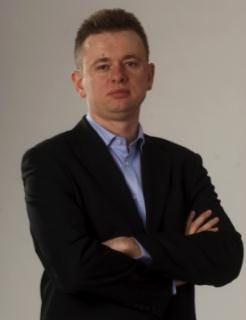
Goran Miletic is Pride Toronto's 2012 international grand marshal. Credit: Zagreb Pride
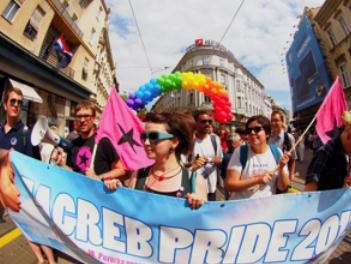
Zagreb Pride, 2011. Credit: Zagreb Pride
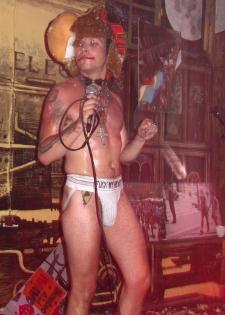
Partying at Zagreb Pride. Credit: Zagreb Pride
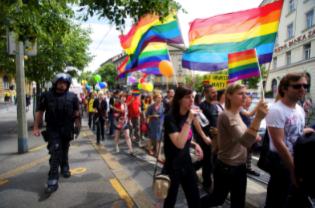
Zagreb Pride, 2011. Credit: Zagreb Pride
When Goran Miletic walks down Yonge St as international grand marshal of Toronto Pride, a crowd of thousands will be cheering him on.
It’s not exactly what he’s used to in his hometown of Belgrade, Serbia.
Miletic, a lawyer, has been fighting for gay rights in Serbia since 1993. “At that time, it really was ‘mission impossible,’” he recalls. “Homosexuality was forbidden by law, and we never obtained registration from the authorities . . . we were not that visible, but we were perceived as traitors by the government.”
Miletic’s group won one major victory — decriminalization of gay sex in 1994 — but dissolved shortly after. “We were under pressure, because [then-president Slobodan] Milosevic considered all civil society groups to be part of Western propaganda.”
That mentality has taken a long time to disappear. In 2001, gays and lesbians in Belgrade made a first attempt to hold a Pride parade, only to have it derailed by a pro-Milosevic counter-protest.
Organizers tried to hold a Pride event in 2009, stopping short only when graffiti saying “Death to fags” and “We’re waiting for you” appeared all over the capital on the eve of the parade. The graffiti was attributed to an ultranationalist group called Obraz, or “honour,” whose young leader, Mladen Obradovic, called the ban “a great victory for normal Serbia.” In 2010, anti-gay demonstrators threw bricks, bottles, flares and Molotov cocktails at Pride marchers, sending 140 people to hospital and causing more than 1 million euros ($1.3 million Canadian) in damage. City authorities cancelled the 2011 parade, ostensibly for the marchers’ own safety.
Miletic blames Milosevic-era paranoia, “football hooligans, religious fundamentalists and radical nationalists” for creating a climate of fear in the former Yugoslavia. Prides and other pro-gay events have historically been risky undertakings in the Balkans. Several pro-gay marches in neighbouring Croatia have ended violently; eight people were injured in scuffles with rightwing protesters at the 2008 Sarajevo Queer Festival in neighbouring Bosnia, and queer activists in Albania cancelled a planned Pride parade in April after deputy defence minister Ekrem Spahiu suggested gay marchers should be “beaten with thick sticks.”
“I have nothing against gays, but I don’t go to Pride,” says this reporter’s host in Zagreb, an articulate university graduate in his 20s who wants to be called Josip. “Why? I don’t want to get stoned, that’s why.”
While the majority of Serbs, Croats, Bosnians and Albanians might not agree with the bloodthirsty sentiments of groups like Obraz, homophobia and suspicion of gays are still widespread. Miletic cites surveys done by the Serbian organization Gay Straight Alliance, which state that 70 percent of Serbs call homosexuality an illness and 30 percent believe the government should actively suppress it.
Josip blames the education system. “I’m educated and my parents are intellectuals, so I’ve always thought, ‘What another man does in his bedroom, how does that hurt me?’” he says. “But in our schoolbooks we learn, and our teachers tell us, that gays are sick. The Catholic Church also has a strong influence here.
“I had a friend that came out, and his mother said, ‘Hitler was such a good man to kill all of the gays’ and told him to get out of the house . . . she was a smart, funny woman and you’d think she’d be open-minded, but you never know with people,” he says. “I am not saying that’s typical, but it still happened.”
Zagreb activist Karla Horvat Crnogaj sighs when she hears this story.
“Our society is a conservative one, and when some people don’t ‘fit in,’ others seem to be offended somehow,” says Crnogaj, who was forced out of her job in the music industry after she came out. “We have the laws [against workplace discrimination], but enforcing them is another matter.”
Gaybashing is still alarmingly common — a young woman wearing a T-shirt with pro-gay slogans was stabbed last October in downtown Belgrade.
But as difficult as the situation seems, for Crnogaj and her colleagues, it is not mission impossible.
“That first Pride [Zagreb Pride in 2002], we had 300 people, and 27 people were beaten up before and after the Pride,” says Marko Jurcic, who lives in Zagreb. “People were surrounding us, cursing and shouting . . . but we walked down the streets we wanted to walk. For us at the time it was successful. We were so happy we broke the silence.” Now, Jurcic says, Zagreb Pride regularly draws more than 1,000 people and, while rightwing troublemakers do show up, the tone of the discourse has been turned down noticeably. “You just don’t hear such violent hate speech anymore. And many of the people who come to march with us are young, kids who were 10 years old when we started.”
Enida Bogdani is a 23-year-old communications assistant at Pink Embassy, the queer community centre in Tirana, Albania’s capital. Its offices are filled with young, cheerful employees tapping on cutting-edge computers; its spacious, rainbow-bedecked meeting room is furnished with an iconic purple velvet sofa. Bogdani and her colleagues radiate excitement. “Until three or four years ago Albania was clueless about LGBT rights,” Bogdani says. “Homosexuals were invisible. But for the last three years we’ve done a lot of visibility, and now society is talking . . . you can mention the word ‘homosexual’ to people and they will not freak out.” Antidiscrimination laws came into force in 2009, and Albania is one of the few countries to include gender identity in such laws.
“In Albania, you have the typical verbal, and sometimes physical, harassment in schools . . . but I’m not afraid to go out,” adds another Pink Embassy employee, who calls himself Amari. “You don’t have the same kind of hooligans in Albania. An Albanian might be just as homophobic as a Serb, but he’s not going to say, ‘Let’s go find a queer and kick him around.’”
Across the region, encouraging steps are being taken. Croatian courts charged 23 “football hooligans” with hate crimes in the summer of 2011 after Pride marchers were roughed up in the coastal town of Split, according to an ILGA-Europe report. Mladen Obradovic was sentenced earlier this month to two years in prison for hate speech in connection with the 2009 threats. Ekrem Spahiu, the Albanian politician who suggested that marchers should be beaten, received a direct public rebuke from President Sali Berisha. Montenegro, a nation of 630,000 people sandwiched between Bosnia and Albania, recently added sex reassignment surgery to the list of operations covered in its national health plan.
Miletic proudly ticks off the achievements of queer activism in Serbia in the past several years: “We had the new labour law adopted in 2005, the law against discrimination in 2009, the new law on higher education, the law on public information and the new broadcasting law, all of which explicitly prohibit discrimination based on sexual orientation.”
In Croatia, Prime Minister Zoran Milanovic told daily newspaper Jutarnji List that the government plans to legalize civil unions in the years to come.
“I think we must go forward, and be inspired by the most advanced countries in the world. Giving stronger civil legal rights to gay communities will not deprive anyone of their rights,” Milanovic told the paper.
Serbia and Albania are candidate states for the European Union; Croatia will join in 2013 after its citizens agreed in a referendum this past winter. While Miletic downplays the importance of EU conditionality in Serbia (“Gay and lesbian issues aren’t always a priority for the EU; they’re only interested sometimes”), Jurcic believes it’s very important.
“Croatian institutions were doing nothing for gay rights until the last five years,” he says. “When a country accedes to the EU it has to pass strict standards; for example, police must recognize hate crimes, so now institutions are being formed to combat hate crimes,” he says. “I don’t know what [long-term] impact it will have; we’ve made a lot of progress during the negotiations, but now we’ll no longer have the carrot and stick.”
Amari fears that the steps Albania’s queer community takes forward may lead to increased violence. “The more advanced our rights are and the more visible we are, the more attacks we might have. We’re certainly not kissing or hugging in the street; there is still a lot of ignorance.”
“We’ve made a lot of progress in 20 years,” Bogdani adds. “Albania is a country full of hope, a very young country with a need for guidance and education. I want to see LGBT people who are free and responsible; that’s the Albania I’d like to see.”
“I spoke to [British activist] Peter Tatchell, and he said we in Croatia were where Britain was in the 1980s,” Jurcic says. “He said, ‘You are not alone; this is a process we all went though.’”
“In the future,” Jurcic adds, “I want to work on educating people about who we are; that is still very necessary. I hope I won’t be working on hate crimes much longer.”
When Goran Miletic meets the Canadian queer community at Toronto Pride, despite the progress that has been made, his message will be that a lot remains to be done, in the Balkans and around the world.
“I’m very excited; I’ve worked with activists in Canada but never been there,” Miletic says. “It’s important that you achieve more and more freedoms, because we are fighting for the same thing in our countries.”
Surrounded by all the floats and pageantry of the summer tradition that Toronto Pride has become, it’s easy to forget that the first gay pride events were not festivals but protests, against the indignities of the Stonewall riots, the bathhouse raids and HIV-based discrimination. In the Balkans, queer people march to remember violence and legal discrimination — which are still very real and present threats.
“Pride is still very political,” Jurcic says. “Everyone wants to have fun, of course, but we can’t forget why we’re out here.”
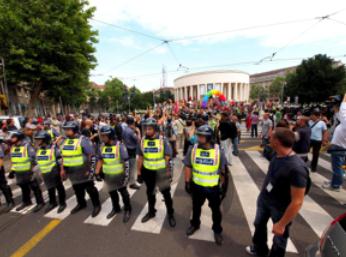

 Why you can trust Xtra
Why you can trust Xtra


